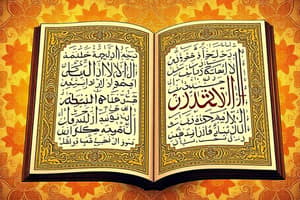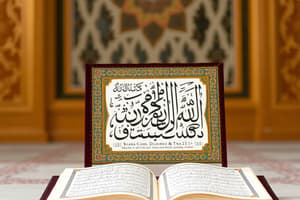Podcast
Questions and Answers
What is the significance of the Birmingham Quran manuscript?
What is the significance of the Birmingham Quran manuscript?
- It was discovered in Yemen in 1972
- It is the earliest known copy of the Quran (correct)
- It was written by Zayd ibn Thabit
- It is the most complete version of the Quran
What is the name of the standard version of the Quran, established by Caliph Uthman?
What is the name of the standard version of the Quran, established by Caliph Uthman?
- Ali codex
- Zayd ibn Thabit codex
- Abu Bakr codex
- Uthmanic codex (correct)
What is the name of someone who has memorized the entire Quran?
What is the name of someone who has memorized the entire Quran?
- Mullah
- Imam
- Sheikh
- Hafiz (correct)
What is the primary subject matter of the Quran?
What is the primary subject matter of the Quran?
What is the doctrine of the last day and eschatology in the Quran?
What is the doctrine of the last day and eschatology in the Quran?
What is the literary style of the Quran?
What is the literary style of the Quran?
What is tafsir in relation to the Quran?
What is tafsir in relation to the Quran?
What is the name of the discipline that determines how the Quran should be recited?
What is the name of the discipline that determines how the Quran should be recited?
What is the claim of divine origin for the Quran?
What is the claim of divine origin for the Quran?
Flashcards
What is the Quran?
What is the Quran?
The central religious text of Islam, believed by Muslims to be a revelation from God.
Who is a Hafiz?
Who is a Hafiz?
A person who has memorized the entire Quran.
What are Surahs?
What are Surahs?
Chapters in the Quran.
What is Tafsir?
What is Tafsir?
Signup and view all the flashcards
What is Tajwid?
What is Tajwid?
Signup and view all the flashcards
What is Reappropriation?
What is Reappropriation?
Signup and view all the flashcards
What is Quranic literalism?
What is Quranic literalism?
Signup and view all the flashcards
Venice Quran (1537-1538)
Venice Quran (1537-1538)
Signup and view all the flashcards
What is Sufi interpretation?
What is Sufi interpretation?
Signup and view all the flashcards
Study Notes
The Quran is the central religious text of Islam, believed by Muslims to be a revelation from God, organized in 114 chapters and consisting of verses. It is considered the finest work in Arabic literature and has influenced the Arabic language. Muslims believe the Quran was revealed to the final prophet, Muhammad, through the archangel Gabriel over a period of 23 years. It is considered Muhammad's most important miracle and the culmination of divine messages starting with those revealed to Adam. The Quran is considered either "created" or "uncreated" and is believed to be the literal word of God. It was compiled by Muhammad's companions shortly after his death, with Caliph Uthman establishing a standard version, now known as the Uthmanic codex. The Quran assumes familiarity with major narratives recounted in the Biblical and apocryphal scriptures. Someone who has memorized the entire Quran is called a hafiz. The Quran describes itself as 'the discernment,' 'the mother book,' 'the guide,' 'the wisdom,' 'the remembrance,' and 'the revelation.' Following Muhammad's death, a number of his companions who knew the Quran by heart were killed, prompting the first caliph, Abu Bakr, to collect the book in one volume. Zayd ibn Thabit collected the verses and produced a hand-written manuscript of the complete book. Uthman ordered a committee to use Abu Bakr's copy and prepare a standard text of the Quran due to a slight difference in pronunciation. The present form of the Quran text is accepted by Muslim scholars as the original version compiled by Abu Bakr. Several sources indicate that during Muhammad's lifetime, a large number of his companions had memorized the revelations. In 1972, manuscripts were discovered in the city of Sana'a, Yemen, that were later proved to be the most ancient Quranic text known to exist at the time. In 2015, fragments of a very early Quran, dating back to 1370 years earlier, were discovered in the library of the University of Birmingham, England.The Quran: Significance, Inimitability, Worship, Art, Text and Contents
-
The Quran is the final revelation to humanity, considered a work of divine guidance revealed to Muhammad through the angel Gabriel by Muslims.
-
The Birmingham Quran manuscript, discovered in 2015, is possibly the earliest extant exemplar of the Quran, dating back to 568-645.
-
Muslims believe that the Quran is divinely ordained and corresponds to the wording revealed to Muhammad, and it is protected from corruption.
-
The Quran is revered by pious Muslims, who memorize its 6,200+ verses, and many Muslims refer to it daily to explain their actions and aspirations.
-
The Quran inspired Islamic arts, such as calligraphy and illumination, which are characterized by decorative patterns rather than figurative images.
-
The Quran consists of 114 chapters, known as sūrahs, and its verses contain monotheistic beliefs, narratives of the early prophets, historical events of Muhammad's time, ethical and legal subjects, charity, and prayer.
-
The Quran asserts the existence of God and his omnipotence, depicting him as the creator of everything, and emphasizes the afterlife and the day of judgment.
-
The Quran uses cosmological and contingency arguments to prove the existence of God and refers to the design of the universe as a point of contemplation.
-
The Quran presents the doctrine of the last day and eschatology, which refers to the final fate of the universe, and warns people to be prepared for it.
-
The Quran asserts that God communicated with man through signs and revelations, and messengers of God received and delivered the divine revelations to humanity.
-
The Quran is considered an inimitable miracle by Muslims, and its style has been called "allusive," requiring commentaries to explain what is being referred to.
-
The Quran is treated with reverence by Muslims, and respect for the written text is an important element of religious faith.Overview of the Quran
-
The Quran emphasizes the importance of faith, accountability, and belief in God, and encourages acts of charity and family life.
-
The Quran prohibits practices such as usury and gambling and is a fundamental source of Islamic law.
-
The Quran encourages the study of nature and observation, and many historical Islamic scientists found inspiration in the Quran's verses.
-
The Quran's literary style combines elements of poetry and prose, with phonetic and thematic structures to aid in recall.
-
The Quran has sparked much commentary and explication (tafsir), aimed at explaining the meanings of the verses.
-
Esoteric or Sufi interpretations of the Quran aim to unveil the inner meanings of the text and relate Quranic verses to the inner or esoteric dimensions of consciousness and existence.
-
Tafsir is one of the earliest academic activities of Muslims, and commentators have explained allusions and reconciled apparent conflicts of themes in the Quran.
-
The Quranic text seems to have no beginning, middle, or end, and its nonlinear structure is akin to a web or net.
-
The Quran's message is conveyed with various literary structures and devices, and Muslims assert that the Quranic content and style is inimitable.
-
The physicist Abdus Salam believed that there is no contradiction between Islam and the discoveries that science allows humanity to make about nature and the universe.
-
The Quran's language has been described as "rhymed prose," with rhyme being conspicuous in many of the earlier Meccan suras.
-
The Quran is highly self-referential, with many passages referring to itself as revelation, remembrance, news, or criterion in a self-designating manner.Overview of the Quran: Translation, Recitation, and Interpretation
-
The Quran is the central religious text of Islam, revealed to the Prophet Muhammad over a period of 23 years.
-
Rumi, a prominent Sufi poet, heavily references the Quran in his mystical poetry, and some consider his book Mathnawi a kind of Sufi interpretation of the Quran.
-
Shias and Sufis believe that the Quran has inward aspects in addition to its literal meaning, while Quranic literalism is the belief that the Quran should only be taken at its apparent meaning.
-
Reappropriation is a hermeneutical style used by some ex-Muslims who have converted to Christianity, and involves a reinterpretation of the Quran with less reference to the Islamic scholarly tradition.
-
The Quran has been translated into most African, Asian, and European languages, with the first translator being Salman the Persian in the 7th century.
-
Tajwid is the discipline that determines how the Quran should be recited, covering proper pronunciation, rules of pause and resumption, and musical features.
-
Variant readings of the Quran were established in the 10th century by Ibn Mujahid, with the most popular readings being those transmitted by Hafs and Warsh.
-
The Quran was historically transmitted through manuscripts made by calligraphers and copyists before the advent of printing, with the earliest manuscripts written in the Hijazi style.
-
Arabic movable type printing of the Quran began in the 10th century, with the first complete Quran printed with movable type produced in Venice in 1537-1538.
-
The claim of divine origin for the Quran has been subject to criticism, with some critics pointing to preexisting sources such as the Bible and other apocryphal texts.
Studying That Suits You
Use AI to generate personalized quizzes and flashcards to suit your learning preferences.




